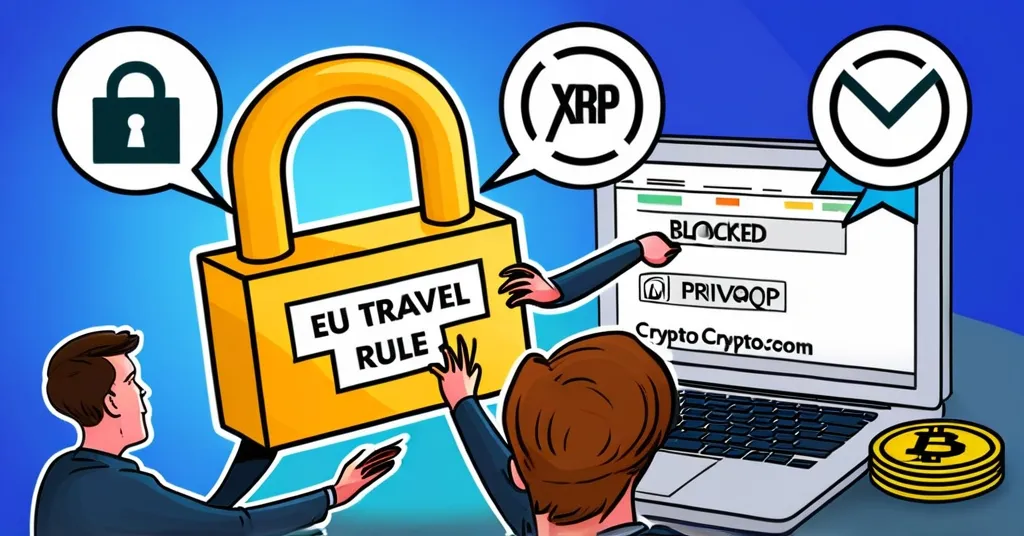Crypto.com’s Premature EU Travel Rule Enforcement Raises Privacy Alarm

Crypto.com’s Early Enforcement of EU Travel Rule Sparks Privacy Concerns
Crypto.com’s decision to block XRP deposits and demand additional transaction details has users up in arms, even before the EU’s Travel Rule officially kicks in. This move not only questions the balance between privacy and compliance but also reignites the debate on centralized vs. decentralized exchanges in the crypto world.
- Crypto.com blocks XRP deposits ahead of EU Travel Rule.
- Users voice privacy concerns over demanded transaction details.
- Centralized vs. decentralized exchanges debate reignited.
Crypto.com, a prominent cryptocurrency exchange, has raised eyebrows by enforcing the European Union’s upcoming Travel Rule ahead of schedule. The EU Travel Rule, officially known as Regulation (EU) 2023/1113, is a new law aimed at preventing money laundering by requiring more information about cryptocurrency transactions. Set to take effect on December 31, 2024, it mandates that cryptocurrency platforms collect and share details like the beneficiary’s name and the origin of the funds. XRP, a popular cryptocurrency used for cross-border payments, is at the center of this controversy. More information about the EU Travel Rule can be found on the cryptocurrency wiki.
This early enforcement was brought to light by Edoardo Farina, CEO of Alpha Lions Academy, who voiced his frustration on an X post. Farina highlighted that despite the rule’s future implementation date, Crypto.com refused to credit his XRP funds without the required information. He questioned the necessity of such details for domestic transactions, sparking concerns over user privacy and rights.
“NOT YOUR KEYS, NOT YOUR CRYPTO 🚨 Europe’s ‘Travel Rule’ for crypto exchanges takes effect on December 30, 2024, but @cryptocom is already taking action. They’re now refusing to credit $XRP deposits unless you provide: 1️⃣ The beneficiary’s name 2️⃣ The origin of the funds” – Edoardo Farina on X
Imagine trying to send your XRP without jumping through hoops – that’s what Crypto.com users are facing right now. Crypto.com’s move is a slap in the face to privacy advocates and a clear overreach of compliance measures. The incident has reignited criticisms often directed at centralized exchanges for their premature and overreaching compliance measures. Past instances, such as the SEC’s lawsuit against Ripple, have shown how regulatory actions can impact the crypto market, often leading to exchanges delisting certain cryptocurrencies or imposing stricter compliance requirements.
The tension between regulatory compliance and the crypto industry’s ethos of decentralization is palpable. Centralized exchanges like Crypto.com and Coinbase are often at the forefront of these debates, facing scrutiny for their actions that some argue infringe on the principles of privacy and autonomy cherished by the crypto community. In contrast, decentralized exchanges, while aligning more closely with these principles, face their own challenges in meeting regulatory standards.
This incident with Crypto.com is just one example of how regulatory compliance is challenging the crypto industry’s core principles. The global trend towards increased regulatory oversight in cryptocurrency markets is evident beyond the EU. As countries worldwide grapple with how to regulate this burgeoning sector, the EU’s Travel Rule might set a precedent for other regions, potentially leading to a more standardized global regulatory framework for cryptocurrencies. For more on the impact of regulatory frameworks, see the discussion on Quora.
While early enforcement has raised privacy concerns, it could enhance security and prevent fraud. By collecting more information about transactions, platforms like Crypto.com might be able to better protect users from scams and illegal activities. However, this comes at the cost of user privacy, and it’s a trade-off that many in the crypto community are unwilling to make. Users have expressed their privacy concerns on Reddit.
From a Bitcoin maximalist perspective, this incident underscores the importance of self-custody and using decentralized platforms. Bitcoin, with its focus on privacy and autonomy, remains the gold standard for those who value these principles. Yet, altcoins like XRP and other innovative protocols also have their place, filling niches that Bitcoin may not serve as effectively. The question remains: can we find a balance where regulatory compliance and the crypto ethos coexist?
As we navigate this landscape, it’s crucial to remember that while regulations aim to protect users, they can also stifle innovation if not carefully implemented. Crypto.com’s early adoption of the EU Travel Rule is like showing up to a party a year early – it’s a bit awkward for everyone involved. But as the sector evolves, so too must our approach to balancing privacy, security, and compliance. For detailed information on Crypto.com’s implementation of the Travel Rule, refer to their FAQ.
Key Questions and Takeaways:
- What is the EU’s Travel Rule, and when does it take effect?
The EU’s Travel Rule aims to prevent money laundering and enhance transparency in crypto transactions. It takes effect on December 31, 2024.
- How did Crypto.com implement the Travel Rule early?
Crypto.com began blocking XRP deposits and requiring users to provide additional transaction information before the official implementation date.
- What concerns did users express regarding Crypto.com’s early enforcement?
Users expressed concerns over privacy and user rights, questioning the necessity of providing transaction details for domestic transfers.
- Why are centralized exchanges often criticized in the crypto community?
Centralized exchanges face criticism for preemptively enforcing regulations and overreaching in their compliance measures, often at the expense of user experience and rights.
- How does the incident reflect broader issues in the crypto industry?
It highlights the ongoing tension between regulatory compliance and the crypto industry’s decentralized ethos, as well as the trend towards increased regulatory oversight globally.
- What are potential benefits of early enforcement?
Early enforcement could enhance security and prevent fraud by allowing platforms to better protect users from scams and illegal activities.



